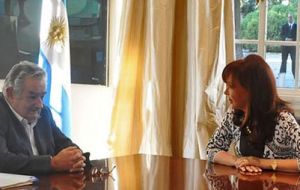MercoPress. South Atlantic News Agency
Cristina Kirchner and Mujica Agree to Re-Channel Bilateral Relations
 Both leaders ignored the pickets’ issue
Both leaders ignored the pickets’ issue Argentine President Cristina Fernández de Kirchner and her Uruguayan counterpart José “Pepe” Mujica said on Wednesday they will be working to “re-channel” bilateral relations and will strictly abide the ruling of the Botnia paper mill case.
This was the first presidential meeting since last week’s ruling from the International Court of Justice on the bilateral dispute over the construction of paper mills on Uruguay’s side of a jointly managed border river.
“We are in a process to re-channel the relationship between both countries,” said Mrs. Kirchner during a statement to the press (no questions were taken) at the Olivos Presidential Residence in which she also ratified the political will to respect the Botnia ruling.
However, President José Mujica cautioned that the presidents “are not magicians” and called for a “process of successive stages” to build mutual confidence adding that it “will take time”. He urged both sides to “clear away the conflict” over the construction of the paper mill which has soured bilateral relations for several years. Precisely; the two leaders were very careful not to mention the roadblocks by protesting pickets on the bridge linking Argentine and Uruguayan towns, Gualeguaychú and Fray Bentos, next to the Botnia plant, who have repeatedly derailed attempts to solve the dispute.
Following the International Court of Justice ruling—accepted by both sides—the main issue remains the pickets blocking the bridge that do not accept the ruling and have promised to continue with their “for life” campaign to protest the alleged contamination from the pulp mill. The two leaders did mention that both countries agreed to boost the involvement of the Río Uruguay Administrative Committee (CARU), a bilateral agency restored by the International Court of Justice which will be in charge of controlling the paper mill keeps to strict environmental standards.
The Argentine President highlighted that the ruling had been accepted not only because of its “legality” but due to the “experience we lived” during the years of the conflict and it was considered more important “to move forward” and “rebuild a bilateral agenda”. Nevertheless, she warned about the need of complying with bilateral deals, specially the River Uruguay Treaty, which has been violated by Uruguay when it decided to continue building the paper mill without a previous debate.
“This conflict has been really expensive and painful, and we humans learn much more from pain than from prosperity. We are going to respect the ruling,” said Mujica after the meeting, which lasted almost an hour and a half. The presidents were joined by Foreign Ministers Jorge Taiana and Luis Almagro, Cabinet Chief Aníbal Fernández and the designated ambassador of Uruguay in Argentina, Guillermo Pomy.
The Buenos Aires press had anticipated that the Argentine Government was expecting an apology from Mujica for Uruguay’s failure to comply with all procedures of the treaty, but earlier in the day before flying to Buenos Aires he said he had no plans to apologize at the meeting: “Only fiancés apologize,” said Mujica metaphorically. “Our reality obliges us to build a friendship that's beneficial for both sides,” Mujica said. “There’s a political will to interpret the historic moment we are living”, added the Uruguayan president, who insisted in describing the long standing conflict with Argentina as “painful” and “costly”.
Uruguay’s Foreign Affairs minister was the first to return to Montevideo and during a brief press conference ratified that Uruguay’s priority in the issue are the pickets blocking the bridge, but “a new era of relations has begun,” he said. Earlier in the day, Mujica had met with former president Jorge Batlle and exchanged ideas about the coming meeting in Buenos Aires. Talking with the press, Batlle said Uruguay has nothing to apologize for, since “we did nothing wrong” adding that “if we lived with a blocked bridge for over three years, we can wait another six/nine months”.
In Buenos Aires, the Argentine press—quoting sources from Casa Rosada—said that the strategy to remove the pickets will most probably be decided by the courts. “There are several demands against the pickets for impeding commerce and normal communications plus other losses. We shouldn’t be surprised if the picket organizations are found guilty and will have to compensate for losses and ordered to lift the blockade”, said a quote from the Buenos Aires media.
Mrs. Kirchner and Mujica are scheduled to meet again sometime in the May 26-31 week at the Uruguayan Presidential Residence in Anchorena to keep analyzing issues of the agenda that will help to “re-channel” the bilateral relationship.




Top Comments
Disclaimer & comment rulesCommenting for this story is now closed.
If you have a Facebook account, become a fan and comment on our Facebook Page!